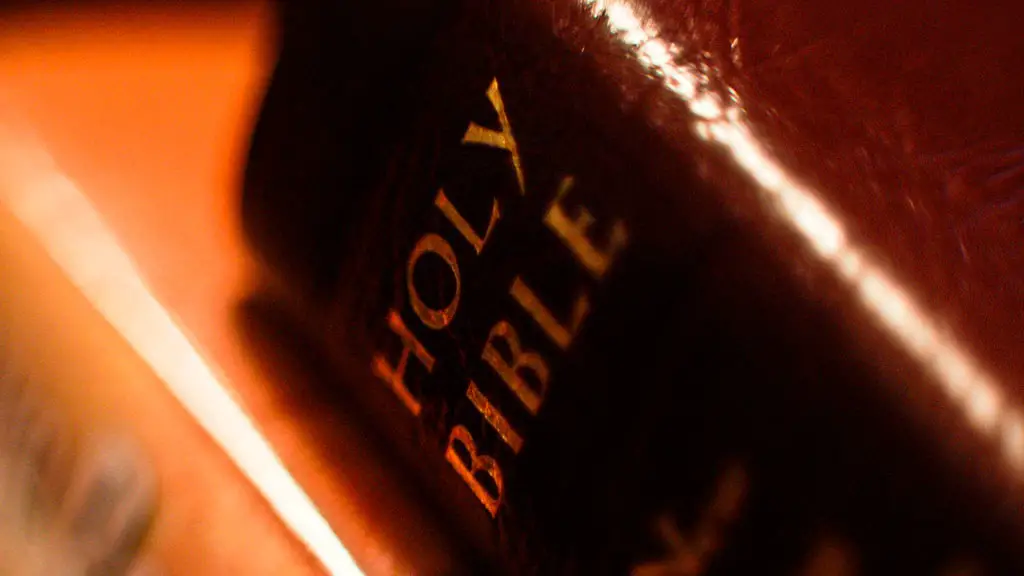Overview
Masturbation has been considered a taboo topic throughout history and is still a controversial topic of debate in some religious circles today. Despite its cultural implications, is it actually sinful and unbiblical? In this article, we dive deep into the underlying answer to that question by exploring both the biblical and scientific perspectives of the topic.
Biblical Perspective
The Bible does not specifically mention masturbation and does not explicitly call it a sin. However, there are multiple interpretations of the Bible that can be used to argue that it is a sin. Those believers may interpret verses from Leviticus as a warning to refrain from masturbation because it is similar to other forms of sexual immorality—such as adultery, bestiality, and homosexuality.
In addition, some Christian theologians have argued that the Bible condemns ‘self-pollution’—the belief that the practice of masturbation stems from an unhealthy passion that can corrupt the soul. This interpretation is based on the idea that the practice of self-gratification does not submit to the will of God and is therefore sinful.
It is important to note that the majority of Christian theologians are in agreement that masturbation is not a sin and that even the few who might believe that it is, also believe that it is a forgivable sin. Furthermore, it is worth noting that some religious denominations—such as the Catholic Church—have modified their views on the matter to give more leniency in recent years.
Scientific Perspective
From a scientific standpoint, it is widely accepted that masturbation is a healthy behavior and causes no physical or emotional harm. Medical experts agree that masturbation serves as a safe and stress-relieving practice that can even help prevent the occurrence of sexual diseases by helping to reduce the risk of risky sexual behavior.
In addition, it is believed to be a normal part of a healthy sex life—and can even enhance a person’s sex life—by allowing them to better understand and practice pleasing themselves. Furthermore, masturbation can be seen as beneficial for physical and emotional health, as it has been found to improve mental concentration, reduce stress and anxiety, increase the production of sleep hormones, and relieve muscle tension.
It is important to note, however, that excessive masturbation can be detrimental to a person’s psyche and physical health, as it can lead to a lack of focus, low libido, hormone imbalances, and even erectile dysfunction. Therefore, it is important to understand one’s sexual needs and to moderate the frequency and intensity of masturbatory sessions.
Spiritual Perspective
From a spiritual perspective, there are multiple interpretations of the Bible that can be used to argue that masturbation is not a sin and that even if it were, it is a forgivable sin. However, some religious denominations—such as the Catholic Church—have modified their views on the matter to give more leniency in recent years.
Regardless of the interpretation, it is important to recognize that the issues of morality, ethics and spirituality are very personal and should be respected as such. Therefore, it is ultimately up to the individual and their own interpretation of the Bible to decide on whether or not masturbation is an act that is permissible in their religious beliefs.
Psychological Perspective
From a psychological standpoint, masturbation can be either a healthy or unhealthy behavior depending on the frequency, intensity, and underlying motivation for engaging in the practice. If practiced in moderation and with the intention to please oneself without damaging personal relationships, then experts agree that it is not a sin and can even have beneficial effects on mental and emotional wellbeing.
However, if practiced excessively or as a substitute for an intimate relationship with another person, this can be an unhealthy habit and can lead to feelings of guilt, anxiety, and depression. Therefore, it is important to take the necessary precautions to ensure that any physical or emotional needs are met in a healthy manner.
Legal Perspective
In terms of laws and regulations, masturbation is a legal activity in all countries around the world. Therefore, individuals are legally allowed to engage in this practice in a private and consensual setting. Furthermore, many countries have laws which protect individuals from any genital harm or exploitation.
However, it is important to note that some countries may have laws that limit the degree of privacy that individuals can engage in when it comes to masturbatory activities. For example, some countries may have laws that limit the kinds of sexual self-gratification that can take place in public, such as prohibiting people from exposing their genitals in public.
Conclusion
In conclusion, while the topic of masturbation may be a controversial one—particularly in all matters related to faith and religion—it is important to recognize that, ultimately, the answer to the question of whether masturbation is against the Bible or not will vary depending on individual beliefs and interpretations.
Regardless of one’s spiritual beliefs, it is important to recognize that the practice of masturbation can be healthy and safe, as long as it is practiced in moderation and with the intention to please oneself without damaging personal relationships. Whenever engaging in masturbation, it is important to take all necessary precautions to ensure that any physical or emotional needs are met in a healthy manner.



